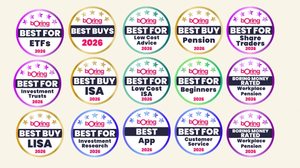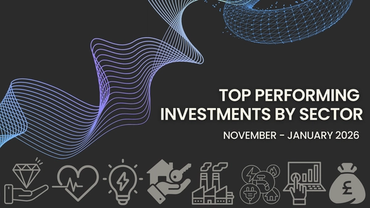Home • Articles • Quality growth investing: How Mid Wynd International Investment Trust plc selects stocks poised for the future
Quality growth investing: How Mid Wynd International Investment Trust plc selects stocks poised for the future
By Boring Money
9 Oct, 2024
This content is a paid promotion and has been created in collaboration with Lazard. It is an advertorial designed to promote Mid Wynd International Investment Trust plc. While we strive to ensure the information provided is accurate and relevant, it reflects the views and messaging of the sponsor.
For many DIY investors, it can be tricky to distinguish genuinely good stocks from potential duds. How do you know if a company’s shares are reasonably priced? How do you determine if it will continue to grow or if it is already nearing - or past - its peak? How do you work out when is the right time to buy?

An investor’s dream is thus to identify companies that are poised for capital growth in the future. The fund managers at Mid Wynd International Investment Trust plc believe the key is all about “quality” and having the expertise to sift through thousands of stocks to find the ones which have what it takes.
Mid Wynd International Investment Trust plc was established in October 1981 with a focus on investing in quality stocks across the globe. Co-managers Louis Florentin-Lee and Barnaby Wilson took over management of the Trust in October 2023 and implemented their institutional Lazard Global Quality Growth strategy. This continued Mid Wynd’s tried-and-tested quality-first approach.
“Our investment philosophy is based on the belief that great companies can also make great investments,” explains Louis. “In other words, we believe that companies that sustain the highest levels of financial productivity outperform the market”.[1]
But what does “quality” mean at Mid Wynd International Investment Trust plc? Louis says it’s about companies that have “high levels of financial productivity that continue into the future,” emphasising that Mid Wynd looks to invest in stocks it believes will “generate high returns on capital and reinvest a significant portion of those returns back into the business to drive future growth”.[2]
They call these companies “compounders” at Mid Wynd, Louis explains, because over longer periods of time their cash flows compound. “This combination of high financial productivity and growth produces a compounding effect on cash flow and earnings, which we believe is particularly valuable. These types of exceptional businesses are often inefficiently valued by market participants, who are focused on near-term multiples rather than the longer-term earnings power of the company.”[3]
When it comes to identifying compounders, however, one needs to have a good eye for potential. It’s all about fundamental research and identifying companies with the fundamental characteristics of compounders – competitive advantages, high returns on capital, reinvestment, and attractive valuation.
Thanks to this long-term growth outlook, Mid Wynd International Investment Trust plc typically has a low turnover and prefers to stick to its convictions. Indeed, there were no buys or sells in Q4 2023 at all. The team maintained that “as the strategy invests in companies that can sustain their competitive advantages and compound returns over the long term, turnover is generally low”.[4]
So far in 2024, they have rejigged the portfolio slightly. One decision was to purchase Salesforce, which supplies customer relationship management software, where there was higher conviction relative to Computershare which was sold. Explaining the reasoning behind the move, Mid Wynd International Investment Trust plc said they believe the firm to be undervalued and so provides a compelling growth opportunity:
“We believe the company is undervalued as it has attractive exposure to secular growth in digital transformation investment, a leading, multiproduct suite strategy, and a sticky, recurring subscription revenue stream, with significant room for margin expansion”.[5]
The portfolio aims for diversification across sectors, industries, regions, and competitive advantages. The portfolio managers believe this is critical in delivering long-term performance.
Much has been made of the so-called “Magnificent Seven” tech stocks – Apple, Microsoft, Alphabet, Amazon, Nvidia, Meta (Facebook) and Tesla. These mammoth tech firms have attracted a great deal of attention from investors over the last few years, helping to drive stock market returns higher and making headlines the world over. In fact, the seven stocks are the same size as the entire stock markets in the UK, Canada, and Japan combined.[6]
The overconcentration of returns in a small set of stocks and the sheer size of these companies means they have a disproportionate impact on the returns of various indices that track them, such as the S&P 500 and the Nasdaq. This lack of diversification makes near-term investment returns especially vulnerable to the fate of these seven (in)famous stocks. This impact was seen as recently as August 2024, when a slew of less-than-stellar results from big tech names helped to drive a market shake-up that saw the S&P 500 lose almost 5% at the start of the month.
The Mid Wynd International Investment Trust plc does have exposure to some members of this group, but not all. Among the top holdings in the portfolio are Microsoft and Alphabet (Google). At the time of writing, these stocks make up 5.3% and 3.7% of the portfolio respectively.
The investment team points out that much of the current concerns that tech stocks are overvalued is warped by the buzz around chipmaker Nvidia. “We certainly do not discount the power of AI, but we believe the market is ascribing most of its value to Nvidia alone, rather than to the many companies that are poised to benefit from this transformative technology. We expect that as the market realises the impact of AI beyond a handful of companies, it will broaden out, and a strategy such as ours, focused on financial productivity and valuation, will benefit in a more normalised market environment.”[7]
Accordingly, potential AI beneficiaries within the portfolio include Taiwan Semiconductor Manufacturing, one of the leading semiconductor producers in the world, and Accenture, a leading IT services company that can help corporate clients digitise and incorporate AI into their businesses.
Also, data-centric businesses such as RELX and Wolters Kluwer can integrate AI-driven services into their products and customer workflows with the potential for incremental revenues and stronger barriers to competition.
While the growth prospects are clear, investors should still be mindful of valuations. Barnaby commented: “While AI has the potential to transform the way companies operate over the long term, we are cautious that the exuberance surrounding the technology has the potential to drive valuations in certain stocks to unsustainable levels in the short term,” he says. “We remain focused on our philosophy of investing in quality companies that can sustain elevated levels of financial productivity.”[8]
In terms of absolute performance, Mid Wynd International Investment Trust plc has delivered 1-year GBP returns of +11.5% and 5-year returns of +43.4%*. It has a strong lead over its benchmark, the MSCI All Country World Index (ACWI), on a 5-year basis of +10.45%* despite trailing over the last twelve months +19.55%*. This longer-term growth is amplified the further back you look; Mid Wynd International Investment Trust plc’s 10-year returns have grown +213.20% against MSCI ACWI’s +11.92%*.[9]
Looking ahead to 2025 and beyond, the investment team believes there is plenty of reason to be optimistic given the fundamentals of the portfolio holdings and the diversification of quality companies. Also, its track record on dividend payments has seen the Investment Trust recently recognised by the Association of Investment Companies (AIC) as being one of the “Next Generation of Dividend Heroes” - investment trusts with 10 or more years of consecutive dividend increases. As of 2024, Mid Wynd International Investment Trust plc has 11 years of increases under its belt with a 5-year dividend growth rate of 6.53% p/a.[10]
In the Global Quality Growth Q2 2024 Strategy Review, the investment team maintained its shrewd attitude to stock selection paints a positive picture for the longer-term outlook. Nearer term, Mid Wynd has delivered +11.5% of 1-year absolute performance* – behind the benchmark perhaps, but nevertheless encouraging returns in the midst of unpredictable markets.
“Though recent [relative] performance has been challenging, in the context of a high-momentum market driven by hyper-growth tech names, we remain confident in our long-term investment approach and continue to believe that a portfolio of attractively valued compounding businesses should produce strong returns over the medium and long term.”[11]
Past performance is not a reliable indicator of future returns.
---
*Performance figures as at end September 2024.
[1] Lazard, Global Quality Growth 2Q24 Strategy Review, July 2024
[2] The Association of Investment Companies, November 2023
[3] Lazard, Global Quality Growth 2Q24 Strategy Review, July 2024
[4] Lazard, Global Quality Growth 4Q23 Strategy Review, January 2024
[5] Lazard, Global Quality Growth 2Q24 Strategy Review, July 2024
[6] BNY Mellon, A Closer Look at Magnificent Seven Stocks, February 2024
[7] Lazard, Global Quality Growth 2Q24 Strategy Review, July 2024
[8] Lazard, Global Quality Growth 4Q23 Strategy Review, January 2024
[10] The Association of Investment Companies, September 2024
[11] Lazard, Global Quality Growth 2Q24 Strategy Review, July 2024
Risks
The value of your investment may rise or fall, and your capital is at risk.
Certain information contained herein constitutes “forward-looking statements” which can be identified by the use of forward-looking terminology such as “may,” “will,” “should,” “expect,” “anticipate,” “target,” “intent,” “continue,” or “believe,” or the negatives thereof or other variations thereon or comparable terminology. Due to various risks and uncertainties, actual events may differ materially from those reflected or contemplated in such forward-looking statements.
The securities mentioned are not necessarily held by Lazard for all client portfolios, and their mention should not be considered a recommendation or solicitation to purchase or sell these securities. It should not be assumed that any investment in these securities was, or will prove to be, profitable, or that the investment decisions we make in the future will be profitable or equal to the investment performance of securities referenced herein. There is no assurance that any securities referenced herein are currently held in the portfolio or that securities sold have not been repurchased.
Any investment in an investment trust involves risk. You should be aware of the following risks when considering investing:
Past performance
Past performance is not a reliable indicator of future returns and does not guarantee future results.
The value of your investment
The value of shares, and any income from them, can fall as well as rise and investors may not get back the amount invested.
Market volatility risk
The value of the Company and any income from it can fall or rise because of movements in stock markets, currencies and interest rates, each of which can more irrationally and be affected unpredictably by diverse factors, including political and economic events.
Emerging and Developed Markets
Emerging and developing markets can face significant political, economic or structural challenges. The portfolio may experience delays in buying, selling and claiming ownership of investments and there is an increased risk that the portfolio may not get back the money invested.
Concentrated
In view of the concentrated nature of the portfolio, the level of risk is expected to be higher than for broader based portfolios and the value may be more volatile.
Smaller companies
Securities of smaller companies may be less liquid, and exhibit more volatile returns, than the securities of larger companies.
Currency risk
The Company’s assets may be priced in currencies other than the fund base currency. Changes in currency exchange rates can therefore affect the Company’s value.
Charges from capital risk
Where charges are taken wholly or partly out of the Company’s capital, distributable income may be increased at the expense of capital, which may constrain or erode capital growth.
Leverage risk
The Company may operate with a significant amount of leverage. Leverage occurs when the economic exposure created by the use of derivatives is greater than the amount invested. Leverage may result in large fluctuations in the Company’s value and therefore entails a high degree of risk including the risk that losses may be substantial.
Important Information
Shares in the Company are a form of equity investment.
This information has been issued and approved by Lazard Asset Management Limited (“Lazard”), 50 Stratton Street, London W1J 8LL. Lazard is investment manager to Mid Wynd International Investment Trust plc (the “Company”) and is authorised and regulated by the Financial Conduct Authority.
This is a marketing communication and does not in any way constitute investment advice or an offer or invitation to deal in securities.
Further information about the Company, including a Key Information Document, is available on the Company’s website www.midwynd.com (http://www.midwynd.com).
Before investing, potential investors should also read the Company’s Investor Disclosure Document.
Forecasted or estimated results do not represent a promise or guarantee of future results and are subject to change. Past performance is not a reliable indicator of future results.
The value of investments and the income from them can fall as well as rise and you may not get back the amount you invested.
Investments in securities, derivatives and commodities involve risk, will fluctuate in price, and may result in losses.
Certain assets held in Lazard’s investment portfolios may trade in less liquid or efficient markets, which can affect investment performance.
There can be no assurance that the Company’s objectives or performance target will be achieved. Any investment is subject to fees, taxation and charges within the Company and the investor will receive less than the gross yield.
MSCI makes no express or implied warranties or representations and shall have no liability whatsoever with respect to any MSCI data contained herein. The MSCI data may not be further redistributed or used as a basis for other indexes or any other securities or financial products. This report is not approved, reviewed or produced by MSCI.
Further Information
Tax Rates
The tax treatment of each investor will vary, and you should seek professional tax advice. The contents of these materials are confidential and should not be disclosed other than to the person or persons for whom it is intended.
Regulation
The Company is listed on the London Stock Exchange and is not authorized or regulated by the Financial Conduct Authority.
Information Subject to Change
The information and opinions expressed here are as of the published date and are subject to change without notice.
Non-Mainstream Pooled Investment (NMPI) status
The Company currently conducts its affairs so that its shares in issue can be recommended by financial advisers to ordinary retail investors in accordance with the Financial Conduct Authority’s (“FAC’s”) rules in relation to non-mainstream investment products and intends to do so for the foreseeable future.
Shares in Mid Wynd International Investment Trust plc are excluded from the restrictions in the FCA rules which apply to non-mainstream pooled investment products, because they are shares in an investment trust.
The shares in the Company may also be suitable for institutional investors who seek a combination of capital and income growth.
Private investors should consider consulting an independent financial adviser who specialises in advising on the acquisition of shares and other securities, before acquiring shares. Investors should be capable of evaluating the risks and merits of such an investment and should have sufficient resources to bear any loss that may result.






